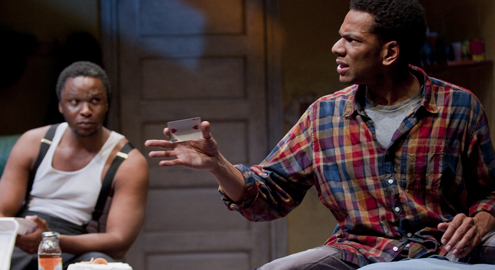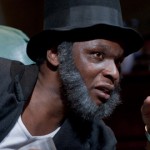 (L to R) Bowman Wright as Lincoln and Biko Eisen-Martin as Booth in Marin Theatre Company’s TOPDOG/UNDERDOG.
(L to R) Bowman Wright as Lincoln and Biko Eisen-Martin as Booth in Marin Theatre Company’s TOPDOG/UNDERDOG.
TOPDOG / UNDERDOG: Drama by Suzan-Lori Parks and directed by Timothy Douglas. Marin Theatre Company (MTC), 397 Miller Avenue, Mill Valley, CA 94941. 415-388-5208 or www.marintheatre.org. September 27 – October 21, 2012
TOPDOG/UNDERDOG at MTC is not for the meek.
When a play wins the Pulitzer Prize that fact rightfully appears prominently in the press releases and so it is with TODOG/UNDERDOG being given a dynamic production in Mill Valley. Not being familiar with all of the Prize winners encouraged this reviewer to do some internet research and some intellectually stimulating information was assimilated. Cogent to this production was the fact that Edward Albee’s Who’s Afraid of Virginia Woolf? that was selected for the 1963 Pulitzer Prize for Drama by that award’s committee was overruled by the award’s advisory board because of play’s then-controversial use of profanity and sexual themes. Luckily for author Suzan-Lori Parks her play appeared in 2002 and mores have undergone a cataclysmic shift in the intervening half century since the Albee play and her play rightfully earned the Pulitzer honor.
Profanity and sexual themes are rampant and are an integral part of the social milieu of the time, place and characters in the play. Parks simply lists Place as ‘Here’ and Time as ‘Now’and that is only 10 years ago. The theme(s) invoked are as cogent today as they were then.
There are only two characters, Black brothers one named Lincoln and the other Booth and there is an intense rivalry between the two, each attempting to be the Top Dog. We eventually learn that they had been abandoned in their formative years by their parents. Each was left a tenuous legacy, with the father favoring older brother Lincoln (think Abel) and the mother favoring Booth (think Cain). With the characters named Lincoln and Booth you should suspect the dramatic ending especially since a loaded gun appears in act one.
But before we get to that point we learn how the characteristic of each has been molded by past and present events. Booth lives in a one room decrepit apartment with only one bed, a reclining chair and no running water (very realistic set by Mikiko Uesugi). Lincoln has been thrown out of his home by his wife and now shares the apartment and sleeps in the chair. Unemployed Booth who is addicted to girlie magazines (euphemistically in street parlance are referred to as ‘one handed books’) that he stores under his bed.
In the opening sequence Booth addresses the audience setting up a table with plastic milk crates and a cardboard overlay to demonstrate his skill at the three-card monte street con at which Lincoln was an expert earning great sums of money. He gave up the game when his conscience rebelled against ripping-off the suckers. . . his name is Lincoln. Since his ‘retirement’ from the game he has a job in an arcade dressed as Abe Lincoln with white face where the audience pays to reenact the assassination of Lincoln. He brings home the money and Booth doles it out for their living expenses. Lincoln’s geartest concern is that he will be fired and replaced by a digital speaking robot.
Even though Booth is accomplished at heisting clothes, food and whatever, he wants to learn the three-card monte line and get to be known as “Three Card.” Lincoln is reluctant to be his teacher and here is the major conflict. This leads to a series of scenes where each demonstrates his abilities in showing that the hand is faster than the eye endlessly repeating the mantra of the dealer. (On opening night some of the cards hit the deck. . . but they will get better) As we all know the game is rigged and the ‘sucker’ never wins when money is on the line. This allows Parks to write a devastating penultimate scene that causes Booth to snap. Before he snaps the secondary plot of Booth’s love life, which is actually a lack of love life whence the girlie magazine, has done irreparable damage to his ego.
Biko Eisen-Martin as Booth is great with is flamboyant bravado that degenerates into hatred and self pity but the final scene is too pat to be believable.
Bowman Wright envelopes the character of Lincoln with grace and conviction. After being fired, thus forcing him to tentatively venture back into the world of three-card monte, his inner turmoil is palpable.
Running time a long two hours and 20 minutes.
Kedar K. Adour, MD
Courtesy of www.theatreworldinternetmagazine.com



